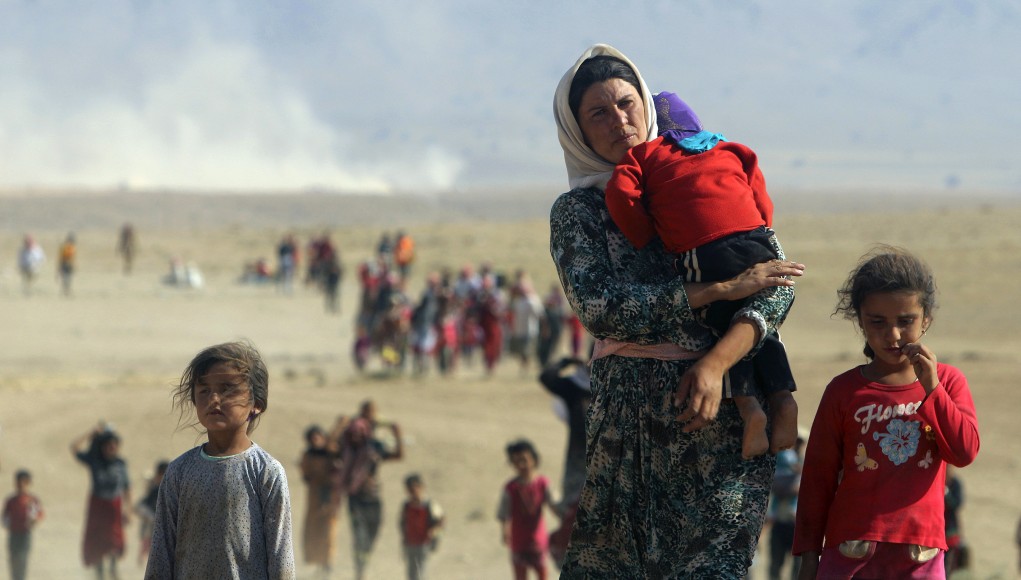February 16th, 2016- In recent years, a large wave of people from Middle Eastern and other countries have been attempting to seek asylum in the United States, Europe, and other various nations, due to the fact that many of their countries are no longer safe to live in because of threats such as the Syrian Civil War, and militant terrorist groups like the Islamic State of Iraq and Syria (ISIS). Since ISIS claims to be an Islamic group, many Westerners are fearful to allow any Muslim refugees into their countries out of fear that they will pose a security threat- for example: what if the United States accidentally allows undercover ISIS members into its borders? In statements brought up by Republican presidential candidates Ted Cruz and Donald Trump, in regards to the refugee crisis, the United States should not allow any Muslim refugees into the countries and should only allow Christians seeking asylum. Similar things have been said in other Western countries as well. However, this raises two important questions, one, is discriminating against potential refugees on the basis of their religion legal and humane, and two, does it actually affect the safety of the American people?
To answer, the first question, yes considering religion as a factor when considering allowing refugees asylum is necessary according to The United States Refugee Act of 1980, which was an amendment, to the earlier Immigration and Nationality Act and the Migration and Refugee Assistance Act. The amendment, which was signed by President Jimmy Carter in 1980, defines a refugee as, anyone who is…
(1) outside his country of nationality (or in the case of a person having no nationality, is outside any country in which he last habitually resided), and who is unable or unwilling to return to such country because of persecution or a well-founded fear of persecution based on race, religion, nationality, political opinion, or membership in a particular social group; or (2) in special circumstances as the President, after congressional consultation, may specify, within the country of his nationality (or in the case of a person having no nationality, within the country in which such person is habitually residing), and who is persecuted or has a well-founded fear of persecution on account of race, religion, nationality, membership in a particular social group, or political opinion,(congress.gov).
However, as this definition states, religion is one factor that may be used when defining the term refugee, but it is not the only factor. Therefore, denying refugees the right to safe asylum on the sole basis of their religion is indeed inhumane and un-American as President Obama stated back in 2015. The Law is clear in stating that a refugee is anyone who faces persecution and does not require refugees to be of a different religion than the persecutors. Therefore, denying all Muslims across the board asylum in the United States based on the fact that ISIS claims to be an Islamic group, is simply inhumane and is also a clear misinterpretation of this amendment.
First off, it is extremely important to note that despite its name, ISIS is in no way, shape, or form, an Islamic group. Just like every other world religion, the main teachings of Islam are that of peace such as treating others fairly with compassion and respect. However, terrorist groups such as ISIS and al-Qaida go against all teachings of the religion, making them, in reality, anti-Islam, despite using the title of being an Islamic group. So-called Islamic terrorist groups use religion as propaganda to recruit new members on the false pretense that they are serving God, or Allah, as he is called in Arabic translation. They also do this purposely to spread hatred across the globe, in order to promote their own cause. For example, if people think of groups such as ISIS to be true representatives of the Islamic religion, they will unfairly discriminate against all people of this faith, which will likely make the Muslim people angry and more likely to want to go against Americans and other people who associate them with these terrorist organizations. This creates a cycle of hatred, which is exactly what groups such as ISIS thrive on when trying to build their brand. To summarize, ignorance leads to mistrust which leads to hatred which leads to retaliation. Furthermore, not only does ISIS go against fundamental Islamic teachings, but they do not hide that their list of enemies includes people of the Muslim faith, most notably, the Islamic sect, Shia.
Just recently, in their official online publication, ISIS declared Shia Muslims to be one of their enemies. ISIS claims that the Shia are infidels and are not true followers of the Muslim faith since they stray from Wahhabi ideals. They recommend the killing, raping, and other inhumane treatment of the Shia people. However, many nations in the Western world do not take note of the differences between the various groups in the Muslim faith, and instead think of it as one large religion as opposed to various small ones. One may think about the Shia versus Sunni question by relating it to the Catholic versus Protestant idea in Christianity; they are both part of the same umbrella religion, but each group has different ideals and has faced different hardships in their histories. Thus, many ignorant people write ISIS off as an Islamic group, despite the fact that it goes against many people of the Islamic religion.
Going back to the amendment; the Shia population, for example, would fit the definition of refugee on three separate terms (1) membership in a particular social group and (2) religion, and (3) political opinion. Since ISIS is adherently against Shia and does not consider them to be Muslims, this means that despite sharing a “common religion” in this case, it is safe to categorize the members of ISIS and the members of the Shia population to be of two different religions as the former does not consider the latter to follow the same religion as themselves. It then goes without saying that they are also persecuted for being part of this group and do not share political opinions with ISIS. However, by limiting refugees into a country based solely on their religion, the entire religion is grouped together, which prevents even those who are being persecuted within that religion to find a safe haven, which is a clear violation of human rights.
That being said, instead of limiting refugees on the basis of which religion they do or do not practice, it is important to look into the issue further and see which groups in particular are being persecuted by the government regime or terrorist group in question. Then, the people of the groups found to be persecuted against should receive asylum, regardless if they happen to be Muslims, Christians, Jews, or of any other religious affiliation. In conclusion, a few bad apples in a particular race, religion, country, etc. should never prevent the group as a whole from receiving basic human rights.










